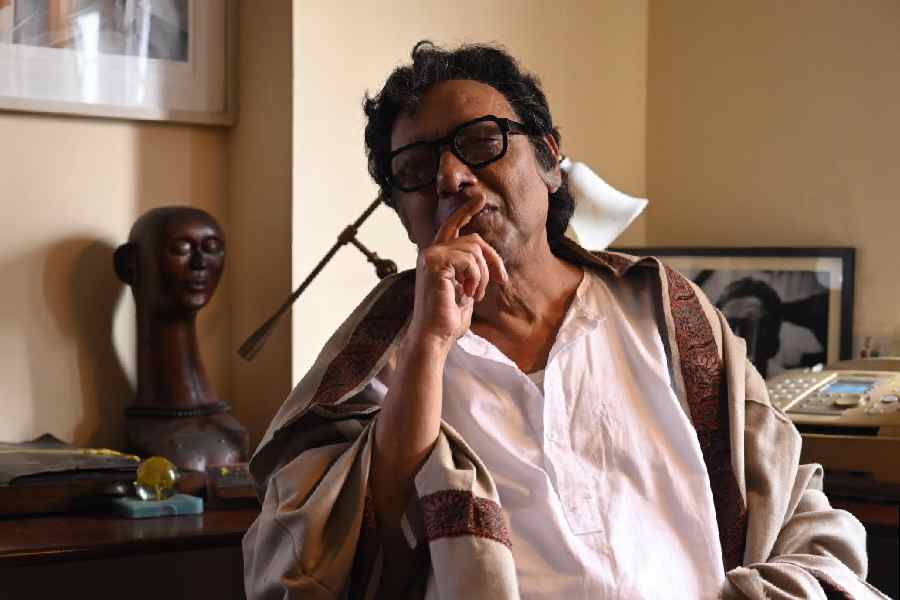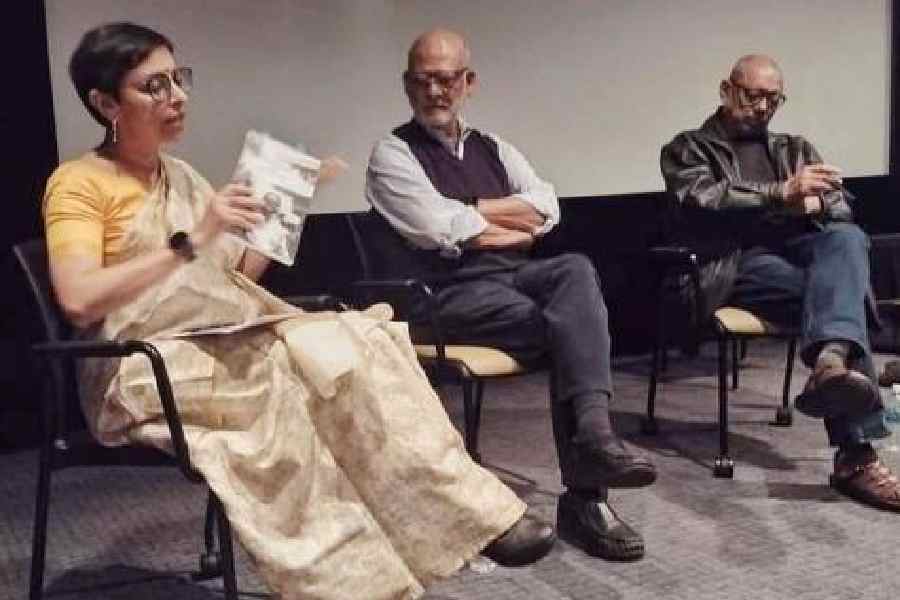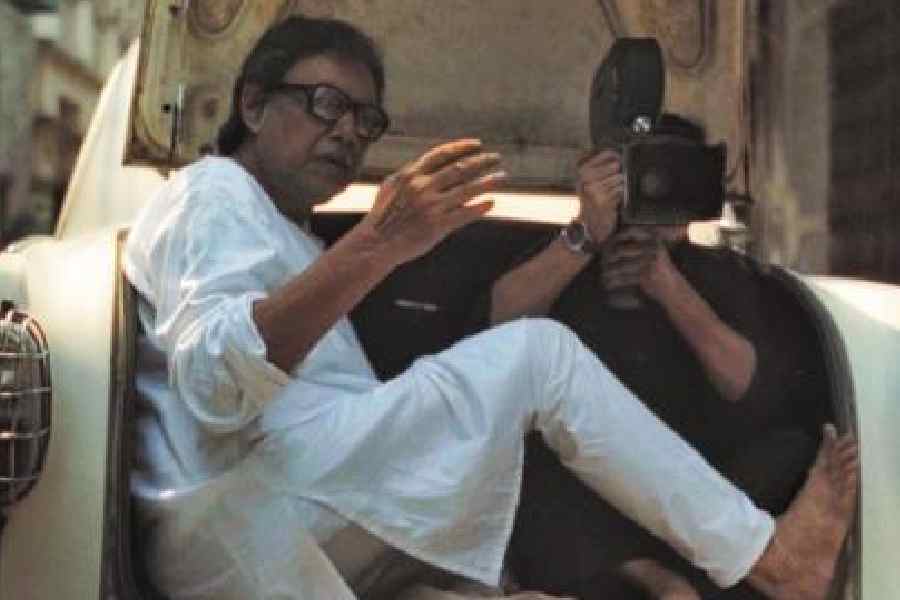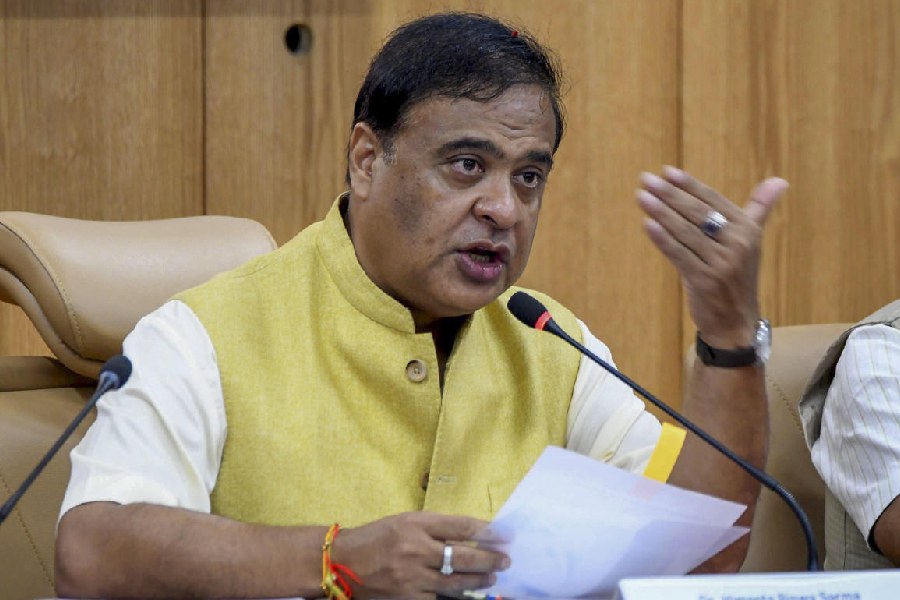It was 8am. I was walking down a road in Hyde Park, Chicago. The winter chill was surprisingly delightful. The sunlight golden. The sky bright blue. The 15-hour flight from Delhi, the hasty checking into a hotel, followed by the trip to Guitar Centre downtown to buy a brand new Martin semi-acoustic, then the warm, cosy dinner at Professor Rochona Majumdar’s, my host, then a brief, deep sleep. It all had washed off the jet lag and whatever fogginess. I focussed on my trip. I was to participate in the three-day birth centenary celebration of Mrinal Sen, organised by the University of Chicago, and talk about my latest feature film on him, Chalchitra Ekhon.
As I walked towards Lake Michigan and sat on a roadside bench, I realised I had never ever dreamed of going halfway around the world to talk about the man who introduced me to the world of cinema. I have travelled to greater parts of the world with or without him to represent his films in foreign festivals. Yet, here I was in Chicago, years after his death, to be a part of a celebration of his cinema with my cinema. Forty-three years of my association with the most dynamic and modern man I have ever met flashed before my eyes. The joy of our arguments, the sheer relish of making movies with him, my differences with him, my attraction for him, and the things I learned from him, all came back. The coffee in the paper cup turned cold as my vision blurred.

Anjan Dutt stars in Chalchitra Ekhon
The three-day elaborate programme titled ‘The Guerrilla Fighter’ included four of his best — Bhuvan Shome on the opening night. Padatik, Akaler Sandhaney and Khandahar on the second day. A fascinating, deeply insightful exhibition of archival material donated to the university by his son Kunal Sen. The exhibition was superbly curated by a senior PhD scholar, Titas Day Sarkar. It comprised rare photographs, articles, letters, awards, scripts, personal items… much of which Kunal perhaps collected from old shoe boxes or God knows where, since Mrinal Sen never cared of the posthumous. Then there was the series of highly insightful lectures by various film scholars from all over the globe. Finally, a discourse with Kunal Sen talking about his book on Sen called Bondhu and myself on Chalchitra Ekhon.
I always knew Mrinal Sen would be celebrated by the world but never knew I would be a part of such an elaborate affair. The programme was kickstarted by Daniel Morgan (former Chair of Cinema and Media Studies) in a packed, intimate Logan Centre auditorium. “The title of the celebration is called ‘Guerrilla Fighter’ cause Sen’s entire body of work represents cinema that disturbs, disrupts and is truly radical,” he said after thanking all participants. “The purpose is to understand and have a dialogue with ourselves and our times through the films of Mrinal Sen,” said the Dean of the Division of Humanities of the University, Deborah Nelson.
Now, I have seen Bhuvan Shome at least 16 times, so I thought I’d slip out of the screening after the inaugural speeches and take an evening walk around the campus and Hyde Park. The Chair of the Department of South Asian Languages and Civilisations, Professor Rochona Majumdar’s introduction to the film about how it brought together so many firsts, from the cinematographer, the actors, including the VO artiste Amitabh Bachchan, made me decide to give it 10 minutes. I ended up watching the entire black-and-white digitally remastered Bhuvan Shome all over again. I was stunned by the sheer innocence which I never considered before. The Nouvelle Vague techniques that marked the beginning of the Indian New Wave were drowned under the utterly endearing, timeless “love story” embedded in the film. I rediscovered that perhaps all of Sen’s films are actually deceptive. The lost, sad eyes of Utpal Dutt after the final buffoonery remained with me till late night at the hotel Hyatt Place.
I did not attend the next day’s screenings knowing that I would miss out on further revisiting and more deceptive layers which Daniel Morgan had hinted at. It was my first time at Hyde Park. I spent the morning checking out the vintage records and old DVDs at the quaint store called Hyde Park Records. All along I was actually thinking of the days of shooting Chalchitra when the gawky 26-year-old myself was confronting the 58-year-old legendary Mrinal Sen for the first time. I was a trained actor who had no problems acting but was swept away by the erratic energy of my mentor, whose ruthless demands were as overwhelming as his unabashed care. My film is as much about my own confusion as about his crazy compassion.
Sitting in the popular Nathan’s, munching my first classic Chicago hot dog, I was convinced that, as of now, there was no other way I could have made my film on him but by showing more of our chemistry than the actual shooting of Chalchitra.
So, when the world-renowned historian and environmentalist Dipesh Chakraborty caught up to treat me to coffee, I ended up telling him what a misfit I was in the ’80s Calcutta and how Sen actually opened up my city to me. Dipesh Babu told me about how his Calcutta and his Leftist crises are still there in films like Padatik and Akaler Sandhaney.
I joined the others on the campus before the screening of Khandahar, which I skipped again. I ended up at Titas Day Sarkar’s studio apartment, cooking a strange concoction with chicken. We discussed how Sen didn’t just make films but recorded time with all his duplicity. With Doors playing on his laptop, amid the cigarette smoke, I ended up telling him that despite not watching the screenings I had been actually revisiting the man and his movies in my mind in ways I had never done before.
Rochona Majumdar, one of the key motivators of the project along with Daniel Morgan, felt: “That we have Sen’s archival material here in our university, thanks to Kunal Sen and Nisha Ruparel-Sen, makes the event more organic, but the driving factor was that Sen’s works are not as widely known in the US as that of his two confreres, Ray and Ghatak. We wanted to have public screenings of his works to spread awareness about this remarkable filmmaker and his truly varied oeuvre.” The most important reason however is “his works speak of so many contemporary concerns. I think they offer vital resources in helping us to think through many of the intricate problems of our own time”.
It was truly wonderful to catch up with Kunal Sen and his wife Nisha Ruparel-Sen in their territory. They were unassuming and warm-hearted and had aged gracefully. Kunal admitted that immediately after his father’s death several Indian organisations approached him for his archive but to him except Film Heritage Foundation none had the infrastructure to save documents for centuries to come. In the US, the first to approach him was Stanford University. He was preparing to hand over when the University of Chicago approached him. “Their Regenstien Library is one of the best in the world. I am sure no library in West Bengal can come close to their Bengali book collection. So it was an easy decision. I also realised I’d be close to the material.”

A session with Kunal Sen and Anjan Dutt, which was moderated by Rochona Majumdar
Driving back to my hotel from lectures or parties, I confessed how overwhelmed I was. “What they organised here,” he retorted, “was profoundly moving. What touched me most was how the audience could still connect with his films, especially Padatik, which is still about the political situation in Calcutta in the early ’70s. I am very glad that something is happening at the Kolkata International Film Festival. After all, that was his city, and it’s most meaningful to celebrate his work in that city.”
I caught up with the last part of the lectures by Meheli Sen (Rutgers University), Neepa Majumdar (Pittsburg University) and Manishita Dass (Royal Holloway, London). They were so diverse and insightful that I knew those I missed, like the ones by Mainak Biswas (Jadavpur University) or Anustup Basu (University of Urbana Champaign), were equally engaging. Neepa referred to a Kodak ad that carried an interview of Sen. Monishita referred to Mahaprithibi’s script. I remembered my days in Hindusthan Thompson as a copywriter writing that ad and much later the conflicts we had because I wrote the story of Mahaprithibi and did not agree with the ending. I recalled all the little and big connections I had with Sen beyond that of an actor.
The final chapter, with my film Chalchitra Ekhon and Kunal Sen’s Bondhu, moderated by Rochona Majumdar, was to come. Kunal signed autographs for his book. I nervously smoked three cigarettes outside the Lee Cobb auditorium and watched the sunset on the glorious campus.
The discussion became rather emotional. The otherwise extremely precise, logical, objective and witty Kunal became a little raspy when questioned about the house and the household of Sen. I hummed and hawed and gesticulated more than talk. The two 70-plus who had long and not-so-long connections with the house were actually products of that house in Bhowanipore in very different ways. I am not sure whether we could convey our deepest debts to that house that gave us our freedom and choice to be whatever we have become. The audience and their questions seemed that they got the drift. No one realised the tears of gratitude we tried to hide despite innumerable differences with Sen. I am a trained actor who can withhold private emotion. I was amazed at Kunal’s ability to do the same. They were also tears of gratitude to the University of Chicago and all those who organised ‘The Guerrilla Fighter and the Legacies Of Radical Cinema’.
Rochona’s request to end it with two of my songs came as a respite. Supratik Guha, the Professor of Molecular Engineering, so graciously got his own amplifier. Daniel with the students of the science department got the mic and guitar connections. I ended up singing my heart out, the songs from my film on Sen.
At the final dinner at a swanky Tapas Valencia downtown, Daniel told me that the first film he saw of Sen was Kharij. After two vodka cocktails I took a cigarette break with Anustup Basu and Meheli Sen. Meheli said: “Sen’s cinema was never static. Like Godard and Antonioni, he never surrendered to an unproblematic, sedate realism. Uncompromising, uncaring of commerce, he did what his gut guided him.” I ended up telling them that my son Neel Dutt and I decided to finance our film Chalchitra Ekhon because no financier would have allowed us to produce the film the way we made it.
Anustup talked about his childhood in Darjeeling. I talked about how proud I am that my film would have a world premiere at the Kolkata International Film Festival because that’s the city which Sen made me fall in love with.










